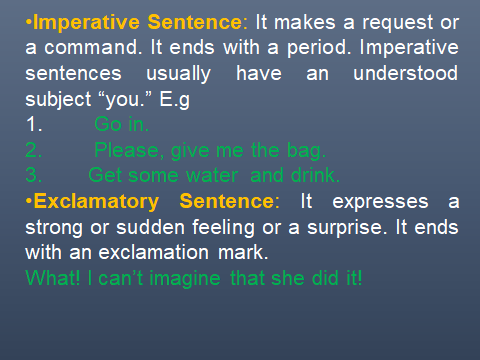The Sentence
Thank you for reading this post, don't forget to subscribe!A sentence is a group of words that contains at least a subject and a predicate and expresses a complete thought.
The following lesson presents to you the definition of a sentence and a clause and also states the different forms of sentence structures and clauses.
You may read through the text or listen to the video below or follow the lesson on YouTube by clicking the link below.
https://youtube.com/c/TaminangThereseN
What is a Sentence?
A clause
A clause is a group of words containing a subject and a predicate and may be used as part of a sentence. The subject of the clause is what is spoken about while the predicate is what is said about the subject. In other words, the subject is that part of the sentence that shows
- who is speaking,
- who is spoken to, or
- the person or thing spoken about.
The predicate is that part of the sentence that tells you what the subject does or what is done to the subject. The core of the predicate is a verb which can also be one word or more than one word. In “Julie has eaten meat” Julie is the subject because it is what is spoken about while “eaten rice” is the predicate, that is, what is said about the subject.
There are various types of clauses:
1. Finite clause,
2. Non-finite clause
3. Main or independent clause
4. Subordinate or independent clause
Finite Clause: it is one with a conjugated verb that expresses a specific time of the action or state expressed by the predicate, for example,
- Susan will drink juice.
- I am going to school.
Non-Finite clause: A non-finite clause is one
whose verb is not conjugated (is in the
infinitive) such that the time of the action or
the state expressed by the predicate is not
specified. E.g
- I want Susan to go home.
- Jane wants to sit with Mark
Main or Independent Clause: it is a group
of words that has a subject and a predicate
and can stand on its own in a sentence. E.g
- You must hurry or you will be late
You must hurry(Indep. Clause) or you will be late. (Indep. Clause) - Paul fetched wood and Mary fetched water.
Paul fetched wood(Indep. Clause) and Mary fetched water. (Indep. Clause)
Subordinate or Dependent Clause: It is a group of
words that has a subject and a verb but does not express a complete thought and therefore, cannot stand on its own in a sentence. It modifies and therefore it must be used with an independent clause. It is always introduced by a subordinating conjunction E.g.
- The people scrambled over the drink because they were hungry.
The people scrambled over the drink (independent clause) because they were hungry. (dependent clause)
- After the wind ceased, we went to church.
After the wind ceased, (Dependent clause) we went to church. (independent clause)
There are two main ways to classify a sentence, that is, through structure and through function.
Sentence Structure
- Simple Sentence: This is a sentence made up of a single clause. Thus, it has only one independent and no subordinate clause. It may have a simple or compound subject and a simple or compound predicate. E.g.
1. We hired a car.
2. I gave a basket to Peter.
3. Mary and James are in class.
•Compound Sentence: it is one made up of two or more independent clauses or simple sentences, joined together by a coordinating conjunction, a colon, or a semi-colon. E.g.
1. My father works on Thursdays and attends church on Saturdays.
2. I love sports but I am physically disabled.
3. Flora loves athletics; Siri loves volleyball; James loves basketball.
•Complex Sentence: it contains one main clause and at least one subordinate clause which provides additional information to the independent clause. The dependent clause may come before or after the main clause but it is identified by the fact that it is introduced by a subordinate conjunction e.g
- We couldn’t present the drama because we arrived late.
- Though we arrived late we were given the opportunity to present the drama.
•Compound Complex Sentence: it contains two or more independent clauses and at least one dependent clause,e.g. If I have to pass my exams, I need to be much serious and I must also be hardworking.
•Declarative Sentence: A declarative sentence makes a statement and ends with a
full stop. It says something about a noun, that is, a place, person, thing, or idea, e.g.
1. I know John’s hobby.
2. Mulu is ten years old.
3. The pen is on the table.
•Interrogative Sentence: it asks a question and ends with a question mark, e.g.
1. Do you know John’s hobby?
2. How old is Mulu?
3. Where is the pen?
•Imperative Sentence: It makes a request or a command. It ends with a period. Imperative sentences usually have an understood subject “you.” E.g
1. Go in.
2. Please, give me the bag.
3. Get some water and drink.
•Exclamatory Sentence: It expresses a strong or sudden feeling or a surprise. It ends with an exclamation mark.
- What! I can’t imagine that she did it!

Click this button to view all posts.


